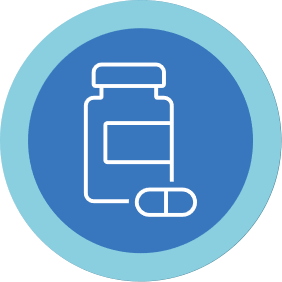
September 21, 2022
Research & Analytics
Uncover the story the numbers tell with a robust data set on a variety of clinical and practice topics, beyond just quality.
Sample Use Cases
 Clinical Trial Design
Clinical Trial Design
Data from the EMDI Registry can help pharma companies accelerate and improve clinical trials by:
- Informing the design of clinical trial protocols
- Leveraging RWD for synthetic control arms or adaptive trial designs
- Identifying appropriate inclusion/exclusion criteria for the targeted patient population
- Supporting site selection by estimating the size of the eligible patient population per geographic region
 Label Extension
Label Extension
Using RWD to study the usage of off-label indications can provide many benefits to pharma companies such as:
- Uncovering insights into drug effectiveness and differentiation for various patient profiles
- Supporting regulatory approval of new indications in lieu of requiring additional clinical trials, saving time and decreasing costs
- Improving patient access to treatments that were formerly off-label
 Medication Adherence
Medication Adherence
Pharma companies can leverage the RWD from the EMDI Registry to improve medication compliance by:
- Identifying drivers of medication non-adherence by analyzing demographic, social, and medical data
- Supporting development of advanced analytics to predict patients who are more likely to become non-adherent
- Developing improved patient engagement strategies
 Market Access & Pricing
Market Access & Pricing
Pharma companies can leverage data from the EMDI Registry and improve market access by:
- Gaining RWD on drug usage outside of clinical trials
- Informing the design of value-based contracts
- Securing formulary status
- Tracking patient outcomes to justify pricing
 Pharmacovigilance & Safety
Pharmacovigilance & Safety
Analyzing the EMDI Registry dataset can enhance pharmacovigilance activities by:
- Discovering previously unrecognized drug-drug, drug-supplement and other relevant interactions
- Identifying subgroups of patients that are at higher risk of adverse events due to comorbid medical conditions or other predisposing risk factors
Peer-Reviewed Publications
- Preliminary Performance on the New CMS Sepsis-1 National Quality Measure: Early Insights From the Emergency Quality Network (E-QUAL)
- Urban and Rural Emergency Department Performance on National Quality Metrics for Sepsis Care in the United States
- A Quality Framework for Emergency Department Treatment of Opioid Use Disorder
- Imaging in Suspected Renal Colic: Systematic Review of the Literature and Multispecialty Consensus
- Preliminary Performance on the New CMS Sepsis-1 National Quality Measure: Early Insights From the Emergency Quality Network (E-QUAL)
- Practice structure and quality improvement activities among emergency departments in the Emergency Quality (E-QUAL) Network
- 336 Pediatric Emergency Department Visits in US Hospitals Across 2019 and 2020
- The future of value-based emergency care: Development of an emergency medicine MIPS value pathway framework
- Choosing wisely in emergency medicine: Early results and insights from the ACEP emergency quality network (E-QUAL)
- Emergency Department Utilization for Emergency Conditions During COVID-19
- Emergency department visits for emergent conditions among older adults during the COVID-19 pandemic
- Development of a qualified clinical data registry for emergency medicine
- Fair Play: Application of Normalized Scoring to Emergency Department Throughput Quality Measures in a National Registry
- A survey of stroke-related capabilities among a sample of US community emergency departments
- Emergency department utilization for substance use disorders and mental health conditions during COVID-19
Posters (PDFs)
- Transforming Substance Use Disorder Quality in our Nation’s Emergency Departments
- Use of CEDR Big Data for Elucidating COVID-19’s Impact on Emergency Care
- Development of the new MIPS reporting option: Learn more about the 2023 Emergency Medicine MVP
- Engaging, Empowering and Elevating Data-Driven Quality in Emergency Medicine
- Reducing HIT Burden & Improving Outcomes
- Engaging, Empowering and Elevating Emergency Care Value


